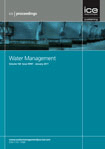
PROCEEDINGS OF THE INSTITUTION OF CIVIL ENGINEERS-WATER MANAGEMENT
Scope & Guideline
Exploring Innovations in Civil Engineering Water Practices
Introduction
Aims and Scopes
- Hydraulic Engineering and Design:
Research related to the design and optimization of hydraulic structures, such as weirs, dams, and spillways, focusing on performance, efficiency, and environmental impacts. - Water Quality and Treatment:
Studies that address the management of water quality, including advanced treatment methods, pollution control, and innovative technologies for water purification. - Hydrology and Water Resources Management:
Investigations into hydrological processes, water resource allocation, and management systems aimed at optimizing water use and sustainability. - Flood Management and Mitigation:
Research on flood risk assessment, modeling, and management strategies to mitigate the impacts of flooding in urban and rural settings. - Emerging Technologies in Water Management:
Exploration of new technologies, including machine learning and remote sensing, for monitoring, modeling, and improving water management practices. - Climate Change Impacts on Water Systems:
Research examining the effects of climate change on hydrological cycles, water availability, and the adaptation strategies necessary for resilient water management.
Trending and Emerging
- Integration of Machine Learning and AI:
Recent publications increasingly utilize machine learning and artificial intelligence for predictive modeling and data analysis in water management, showcasing the potential for these technologies to enhance decision-making processes. - Sustainable and Resilient Water Management Practices:
There is a growing emphasis on sustainable practices that address the dual challenges of climate change and water scarcity, focusing on resilience and adaptation strategies for water systems. - Impact of Climate Change on Hydrology:
Research examining the effects of climate change on hydrological patterns and water resources is gaining traction, highlighting the need for adaptive management strategies in response to changing environmental conditions. - Innovative Water Treatment Technologies:
Emerging technologies for water treatment, including membrane technologies and advanced oxidation processes, are increasingly featured, reflecting the need for cost-effective and efficient solutions to water quality challenges. - Urban Water Management and Infrastructure:
As urbanization continues to rise, there is a trend towards studies focusing on urban water management, including flood modeling, stormwater management, and the integration of green infrastructure.
Declining or Waning
- Traditional Water Supply Systems:
There is a noticeable decline in papers focusing on traditional water supply systems and their management, possibly due to the shift towards more integrated and innovative approaches to water resource management. - Purely Theoretical Models Without Practical Applications:
Research that does not translate theoretical models into practical applications or case studies appears to be less frequent, reflecting a growing preference for studies that demonstrate real-world applicability. - Conventional Irrigation Techniques:
Papers solely centered on traditional irrigation techniques are becoming less common, as the focus shifts toward more advanced and sustainable irrigation practices that incorporate technology and efficiency. - Historical Case Studies:
There seems to be a waning interest in historical case studies of water management practices, with more emphasis being placed on forward-looking research that addresses current and future challenges.
Similar Journals

Water Research X
Leading the charge in water science innovation.Water Research X is a prestigious journal published by ELSEVIER, focusing on the dynamic fields of water science and technology, pollution, ecological modeling, and waste management. Since its inception in 2018, this Open Access journal has become a cornerstone resource for researchers and professionals dedicated to advancing our understanding and management of water resources. Based in the United Kingdom, Water Research X holds an impressive ranking within the Scopus metrics, positioned in the Q1 category across multiple relevant disciplines, including Environmental Science, with a notable rank of 10/261 in Water Science and Technology and 3/41 in Ecological Modeling. This reflects its commitment to disseminating high-quality research that informs policy, supports sustainable practices, and fosters innovation in water management.
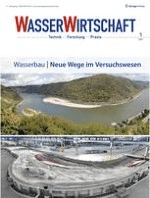
WasserWirtschaft
Connecting academia and practice in water resource stewardship.WasserWirtschaft is a renowned academic journal dedicated to the critical field of water science and technology. Published by SPRINGER VIEWEG-SPRINGER FACHMEDIEN WIESBADEN GMBH, this journal has been a vital resource for researchers, professionals, and students since its inception in 1973, covering an extensive range of topics pertinent to water management, engineering, and environmental sustainability. Although it is currently ranked in the Q4 category of the Water Science and Technology category as per the 2023 Scopus metrics, with a ranking of #246 out of 261, the journal is committed to enhancing the discourse surrounding water resource management through high-quality, peer-reviewed articles. The journal does not operate on an Open Access basis, ensuring that its content is curated and accessible to subscribers while promoting rigorous academic standards. With its historical significance and focus on contemporary water-related challenges, WasserWirtschaft remains an essential publication for stakeholders aiming to advance the science and technology of water resources in a rapidly changing world.

Hydrologie und Wasserbewirtschaftung
Empowering voices in hydrology and water management.Hydrologie und Wasserbewirtschaftung, published by the BUNDESANSTALT GEWASSERKUNDE-BFG, stands as a vital open access journal in the field of hydrology and water management since its inception in 1999. Based in Germany, this journal aims to disseminate high-quality research related to water resources, environmental sustainability, and innovative management strategies. Though it has a Q4 ranking in Water Science and Technology for 2023, and holds a Scopus rank of 113 out of 225, the journal provides an essential platform for researchers, professionals, and students interested in advancing their understanding of water science. With coverage spanning from 1999 to 2018 and a seamless move to an open access model, Hydrologie und Wasserbewirtschaftung remains committed to contributing to the ongoing dialogue around critical water issues. Researchers looking to publish their findings or stay abreast of developments in water science will find this journal indispensable.

JOURNAL OF THE AMERICAN WATER RESOURCES ASSOCIATION
Shaping policy and practice in water management through scholarly excellence.The JOURNAL OF THE AMERICAN WATER RESOURCES ASSOCIATION, published by Wiley, is a premier platform dedicated to advancing the field of water resource management and research. With an ISSN of 1093-474X and an impressive Q1 ranking in multiple categories, including Earth-Surface Processes, Ecology, and Water Science and Technology, this journal serves as a vital resource for professionals, researchers, and students alike. Established in 1967 and set to converge through 2024, it has consistently published cutting-edge research that influences policy and practice in water resource management. The journal's open access option enhances its reach, ensuring that critical findings are accessible to a wider audience. The Scopus rankings further underscore its impact, placing it in the top quartile within its fields, highlighting its importance in shaping scholarly discourse. As a significant contributor to the understanding and management of freshwater systems, the journal offers a crucial means for sharing insights and fostering collaboration in the vital realm of water resources.
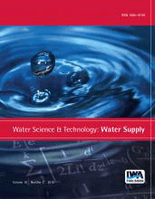
Water Supply
Driving progress in water supply management.Water Supply is an esteemed journal published by IWA PUBLISHING that plays a pivotal role in the field of water science and technology. With an ISSN of 1606-9749 and an E-ISSN of 1607-0798, this journal has been a key resource for researchers and professionals since its inception in 2001. Now covering a wide range of topics until 2024, it is recognized for its impactful contributions, holding a Q2 ranking in the Environmental Science: Water Science and Technology category, and currently stands at rank #125 out of 261 in Scopus, reflecting its relevance and influence in the academic community. The journal aims to disseminate significant research findings and innovations in water supply management, ensuring that professionals and students are equipped with the latest knowledge and practices in the sector. Despite not being an open-access journal, Water Supply continues to attract high-quality submissions that enhance our understanding and preservation of vital water resources. For those invested in sustainable water practices, this journal is an invaluable tool for continued learning and advancement.
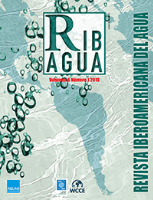
RIBAGUA-Revista Iberoamericana del Agua
Illuminating water research across Ibero-America.RIBAGUA-Revista Iberoamericana del Agua is an esteemed academic journal dedicated to the study and dissemination of water-related research within the Ibero-American context. Published by TAYLOR & FRANCIS LTD, this Open Access journal has been providing a platform for scholarly articles since 2015, promoting visibility and accessibility for researchers, professionals, and students engaged in environmental science, hydrology, and water resource management. With the objective of enhancing the understanding of water issues affecting the Ibero-American region, RIBAGUA invites contributions that address innovative practices, policy implications, and scientific advancements. By fostering inter-regional dialogue and collaboration, it stands as a vital resource for those looking to contribute to sustainable water management solutions. The journal is committed to maintaining high standards of academic integrity and is ideal for anyone seeking to advance their knowledge and research in the water sciences.
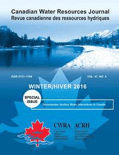
Canadian Water Resources Journal
Elevating discourse in the realm of water science.Canadian Water Resources Journal, published by Taylor & Francis Inc, is a leading academic journal dedicated to the field of water science and technology. With a significant history dating back to its inception in 1976, the journal offers a platform for high-quality, peer-reviewed research that addresses critical issues in water resources management, hydrology, water quality, and policy. The journal is recognized for its valuable contributions to the field, exemplified by its classification in the Q2 category for Water Science and Technology and holding a respectable rank of #137 out of 261 in the Scopus Environmental Science category. While it does not currently offer open access, its articles remain accessible through various institutional subscriptions, ensuring that professionals, researchers, and students stay updated with the latest advancements and discussions in water resources. As it converges towards its ongoing publication commitment through 2024, the Canadian Water Resources Journal remains an essential resource for those engaged in the pursuit of sustainable water management solutions.

Water Practice and Technology
Exploring Innovative Solutions for Water Resource ManagementWater Practice and Technology is a distinguished open-access journal published by IWA PUBLISHING, dedicated to disseminating cutting-edge research and practical insights within the field of water science and technology. With an E-ISSN of 1751-231X, the journal has been at the forefront of sharing knowledge since its inception in 2011 and has transitioned to open access in 2021, providing unrestricted access to high-quality research articles. Based in the United Kingdom, this journal plays a vital role in advancing the understanding of water resource management, treatment technologies, and environmental sustainability. As of 2023, it is categorized in the Q3 quartile for Water Science and Technology with a Scopus rank of #157/261, placing it in the 40th percentile among its peers. Researchers, professionals, and students alike will find the journal a valuable resource for the latest trends, innovations, and practical applications in the water sector, facilitating a collaborative approach towards addressing global water challenges.
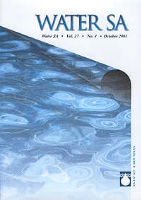
WATER SA
Advancing water science for a sustainable future.WATER SA, published by the WATER RESEARCH COMMISSION, serves as a pivotal platform for interdisciplinary research in the areas of water science and technology. With an ISSN of 0378-4738 and an E-ISSN of 1816-7950, this open-access journal has been committed to disseminating knowledge since 2005, ensuring that research is freely accessible to a global audience. As of 2023, it holds a Q3 ranking in several key categories including Applied Microbiology and Biotechnology, Management, Monitoring, Policy and Law, Waste Management and Disposal, and Water Science and Technology. These rankings reflect its significant contribution to these disciplines, particularly in South Africa where it is based. With a history dating back to 1976 and converging research efforts extending through 2024, WATER SA aims to illuminate pressing water-related challenges and foster innovative solutions through rigorous scientific inquiry. Researchers, professionals, and students interested in the sustainability and management of water resources will find its comprehensive portfolio essential for advancing their work and understanding in an increasingly critical field.

Journal of Applied Water Engineering and Research
Exploring the Future of Water Resource ManagementJournal of Applied Water Engineering and Research is a dynamic platform dedicated to the advancement of knowledge in the field of water science and technology. Published by Taylor & Francis Ltd, this journal aims to bridge the gap between theoretical research and practical applications in water engineering, providing a crucial resource for researchers, practitioners, and policymakers. With an ISSN of 2324-9676 and an impressive ranking in the Q3 category for Water Science and Technology, it occupies a distinctive position within the scholarly community. The journal covers a wide spectrum of topics, including innovative water management strategies, sustainable practices, and the integration of technology in water resource management, thus contributing significantly to the discourse surrounding environmental sustainability. With publication years converging from 2013 to 2024, the Journal of Applied Water Engineering and Research continues to foster impactful research, enhancing our understanding and management of vital water resources.